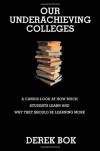Currently reading
McGlue
Knife Fight and Other Struggles
Far from the Tree: Parents, Children, and the Search for Identity
The Good Lord Bird
Ancillary Justice
Our Underachieving Colleges: A Candid Look at How Much Students Learn and Why They Should Be Learning More (New Edition)
Dissident Gardens
Nightmare Movies: Horror on Screen Since the 1960s
The Information: A History, a Theory, a Flood
Complete Novels
 Short blurb: Better than Franzen.
Short blurb: Better than Franzen.Ruprecht van Doren, the slovenly fat roommate of the eponymous--and eponymically deceased--Skippy, loves donuts and SETI and string theory's most prominent Stanford-based proponent Dr. Hideo Tamashi and, if you really pushed past the nerdy theory-fixated stiff upper lip, Skippy. And it is among the novel's many, many pleasures that it delights in taking Ruprecht's loves seriously, even while simultaneously exploiting their silliness. This is point one in support of the blurb. Murray isn't a satirist; he's a comic writer. The difference--with Franzen as counterpoint--is love for the characters.
But it is at times a cruel, pointed, destructive love (and aren't they all?). Most of the characters lose, callously disregard, repress, cover up, confusedly and impotently fumble toward, or simply fail to understand their love. But there's nothing callous in Murray, instead just a seemingly boundless generosity, even when revealing the stunted asinine selfishness of people: A priest assigned to counsel Ruprecht, reeling for weeks from the death of Skippy, gets rather pissed off that all the effort he'd put in to "understanding the gravity and delicacy of this particular case"--so much so that he'd "took the trouble of washing his hair again [that] morning, and spent the quarter-hour prior to the interview arranging it until he judged it exactly right"--all this effort is "contrast[ed]" with "the young man on the other side of the desk . . . . who clearly does not care a jot about impressions.
His posture is slovenly, he is grossly overweight and, to top it off, he will not speak! Not one word! Father Foley struggled for several minutes to 'get through' to him; now he addresses his comments solely to the parents, leaving the boy out of it. See how he likes it!
Later the priest pushes Ruprecht toward performance in the big 140th Anniversary Contest, and recalls his own past musicality, recalls "strap[ping] on the guitar and strum[ming] out a few 'hits' for the entertainment of long-term and terminally sick children in hospital? The way those youngsters had looked at him! He was quite the 'pop star'. . . ."
It is rare to find an adult whose attempts to "help" or respond to others isn't tinged by a deep mean streak of (funny) selfishness, and equally rare to find a kid whose callow selfishness isn't tinged by a deep confused vein of empathy and (when it matters) compassion. Murray, like Franzen, frets and fumes (and is furious) about our selfishness. But Franzen gets stuck on diagnosing that selfishness, while Murray is as invested in understanding and diagnosing the latter possibilities, too--the capacity we have for cruelty revealed as cartoonish ('though no less destructive), the opportunities we have for seeing past ourselves to think about others never utterly ignored, and--in rare moments--embraced.
I found this book consistently funny and often surprisingly moving. The plotting--and some of the character types--were alas never surprising; the book's sole flaw is an unabashed embrace of conventions. But the comfort (or dis-) of those cliches is simply vehicle: it allows so much lovely writing, so much detailed attention to the peculiarities of each of the many (many, many) characters, so many moments of transport into the comic sublime... it's hard to complain. I really loved this novel, and not just in fond remembrance of my own Ruprechtian childhood...












